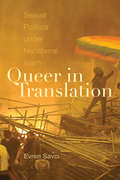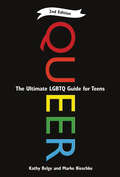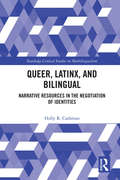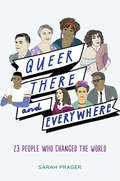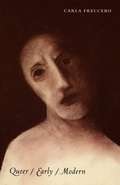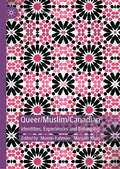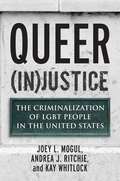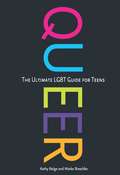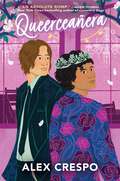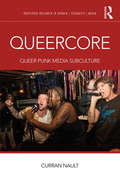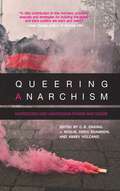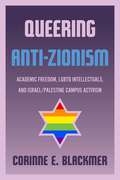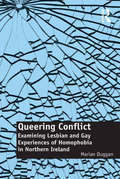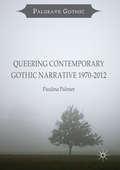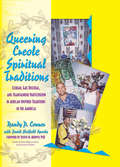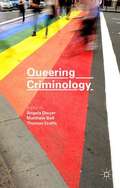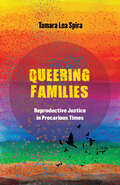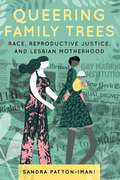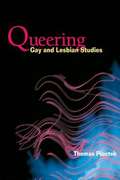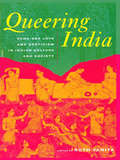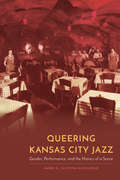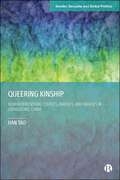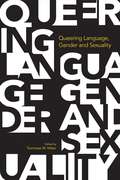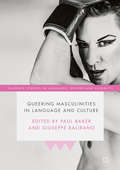- Table View
- List View
Queer in Translation: Sexual Politics under Neoliberal Islam (Perverse Modernities: A Series Edited by Jack Halberstam and Lisa Lowe)
by Evren SavciIn Queer in Translation, Evren Savcı analyzes the travel and translation of Western LGBT political terminology to Turkey in order to illuminate how sexual politics have unfolded under Recep Tayyip Erdoğan's AKP government. Under the AKP's neoliberal Islamic regime, Savcı shows, there has been a stark shift from a politics of multicultural inclusion to one of securitized authoritarianism. Drawing from ethnographic work with queer activist groups to understand how discourses of sexuality travel and are taken up in political discourse, Savcı traces the intersection of queerness, Islam, and neoliberal governance within new and complex regimes of morality. Savcı turns to translation as a queer methodology to think Islam and neoliberalism together and to evade the limiting binaries of traditional/modern, authentic/colonial, global/local, and East/West—thereby opening up ways of understanding the social movements and political discourse that coalesce around sexual liberation in ways that do justice to the complexities both of what circulates under the signifier Islam and of sexual political movements in Muslim-majority countries.
Queer, 2nd Edition: The Ultimate LGBTQ Guide for Teens
by Kathy Belge Marke BieschkeTeen life is hard enough, but for teens who are LGBTQ, it can be even harder. When do you decide to come out? Will your friends accept you? And how do you meet people to date? Queer is a humorous, engaging, and honest guide that helps LGBTQ teens come out to friends and family, navigate their social life, figure out if a crush is also queer, and challenge bigotry and homophobia. Personal stories from the authors and sidebars on queer history provide relatable context. This completely revised and updated edition is a must-read for any teen who thinks they might be queer or knows someone who is. "A delightful collection of trustworthy and accurate information that tweens and teens need today, all told in a sort of quirky, sometimes goofy, and always approachable tone...a fun, easy to read, and occasionally hilarious guide that should be available on a shelf in every high school library." —Diane Anderson-Minshall, Editorial Director, The Advocate magazine "Not every queer kid has easy access to a family member, teacher, counselor, or friend who can help them through the coming-out process. Even when they do, NEWSFLASH, most of us don't have all the answers! Queer is a great way for a teen, or someone who is trying to mentor or understand a queer teen, to gain some knowledge from a thoughtful, cute perspective."—Honey Mahogany, Activist, RuPaul's Drag Race Alumnus, Cofounder of the Compton's Transgender Cultural District "I learned more than a few things about our fabulously diverse queer culture, and especially the younger generation, that everyone should know."—Terry Beswick, Executive Director of the GLBT Historical Society Archives and Museum
Queer, Latinx, and Bilingual: Narrative Resources in the Negotiation of Identities (Routledge Critical Studies in Multilingualism)
by Holly CashmanShortlisted for the 2018 BAAL Book Prize This book is a sociolinguistic ethnography of LGBT Mexicans/Latinxs in Phoenix, Arizona, a major metropolitan area in the U.S. Southwest. The main focus of the book is to examine participants’ conceptions of their ethnic and sexual identities and how identities influence (and are influenced by) language practices. This book explores the intersubjective construction and negotiation of identities among queer Mexicans/Latinxs, paying attention to how identities are co-constructed in the interview setting in coming out narratives and in narratives of silence. The book destabilizes the dominant narrative on language maintenance and shift in sociolinguistics, much of which relies on a (heterosexual) family-based model of intergenerational language transmission, by bringing those individuals often at the margin of the family (LGBTQ members) to the center of the analysis. It contributes to the queering of bilingualism and Spanish in the U.S., not only by including a previously unstudied subgroup (LGBTQ people), but also by providing a different lens through which to view the diverse language and identity practices of U.S. Mexicans/Latinxs. This book addresses this exclusion and makes a significant contribution to the study of bilingualism and multilingualism by bringing LGBTQ Latinas/os to the center of the analysis.
Queer, There, and Everywhere: 23 People Who Changed the World
by Sarah Prager Zoe More O'FerrallThis first-ever LGBTQ history book of its kind for young adults will appeal to fans of fun, empowering pop-culture books like Rad American Women A-Z and Notorious RBG.World history has been made by countless lesbian, gay, bisexual, transgender, and queer individuals—and you’ve never heard of many of them. Queer author and activist Sarah Prager delves deep into the lives of 23 people who fought, created, and loved on their own terms. From high-profile figures like Abraham Lincoln and Eleanor Roosevelt to the trailblazing gender-ambiguous Queen of Sweden and a bisexual blues singer who didn’t make it into your history books, these astonishing true stories uncover a rich queer heritage that encompasses every culture, in every era. By turns hilarious and inspiring, the beautifully illustrated Queer, There, and Everywhere is for anyone who wants the real story of the queer rights movement.A Junior Library Guild Selection
Queer/Early/Modern
by Carla FrecceroIn Queer/Early/Modern, Carla Freccero, a leading scholar of early modern European studies, argues for a reading practice that accounts for the queerness of temporality, for the way past, present, and future time appear out of sequence and in dialogue in our thinking about history and texts. Freccero takes issue with New Historicist accounts of sexual identity that claim to respect historical proprieties and to derive identity categories from the past. She urges us to see how the indeterminacies of subjectivity found in literary texts challenge identitarian constructions and she encourages us to read differently the relation between history and literature. Contending that the term "queer," in its indeterminacy, points the way toward alternative ethical reading practices that do justice to the aftereffects of the past as they live on in the present, Freccero proposes a model of "fantasmatic historiography" that brings together history and fantasy, past and present, event and affect. Combining feminist theory, queer theory, psychoanalysis, deconstruction, and literary criticism, Freccero takes up a series of theoretical and historical issues related to debates in queer theory, feminist theory, the history of sexuality, and early modern studies. She juxtaposes readings of early and late modern texts, discussing the lyric poetry of Petrarch, Louise Lab, and Melissa Ethridge; David Halperin's take on Michel Foucault via Apuleius's The Golden Ass and Boccaccio's Decameron; and France's domestic partner legislation in connection with Marguerite de Navarre's Heptameron. Turning to French cleric Jean de Lry's account, published in 1578, of having witnessed cannibalism and religious rituals in Brazil some twenty years earlier and to the twentieth-century Brandon Teena case, Freccero draws on Jacques Derrida's concept of spectrality to propose both an ethics and a mode of interpretation that acknowledges and is inspired by the haunting of the present by the past.
Queer/Muslim/Canadian: Identities, Experiences and Belonging (Global Queer Politics)
by Momin Rahman Maryam KhanThis book presents original qualitative research on the lives, identities, and experiences of queer Canadian Muslims and is the largest study to date on this population. Presented through a queer intersectional framework, the volume contains core evidence-based chapters on the lived experience, as well as the transnational politics of Islamophobia and LGBTQ+ rights promotion, the research on Muslim attitudes to queer issues, and the representations of queer Muslim issues within Canada. Key issues covered include: queer Muslim organizing, how queer Muslims reconcile faith, sexuality and gender identity through affirmative and liberatory frameworks and actions, how Muslims in Canada respond to sexual and gender diversity. The contributors also lay out future academic and research possibilities for further investigation and for the development of equity practices for recognizing and challenging the oppressions suffered by queer Muslims, addressing the discussion to queer Muslims as well as mainstream LGBTQ+ groups and mainstream Muslim groups.
Queer: The Criminalization of LGBT People in the United States (Queer Ideas/Queer Action #5)
by Kay Whitlock Joey Mogul Andrea RitchieA groundbreaking work that turns a "queer eye" on the criminal legal system Drawing on years of research, activism, and legal advocacy, Queer (In)Justice is a searing examination of queer experiences--as "suspects," defendants, prisoners, and survivors of crime. The authors unpack queer criminal archetypes--like "gleeful gay killers," "lethal lesbians," "disease spreaders," and "deceptive gender benders"--to illustrate the punishment of queer expression, regardless of whether a crime was ever committed. Tracing stories from the streets to the bench to behind prison bars, the authors prove that the policing of sex and gender both bolsters and reinforces racial and gender inequalities. A groundbreaking work that turns a "queer eye" on the criminal legal system, Queer (In)Justice illuminates and challenges the many ways in which queer lives are criminalized, policed, and punished. streets and behind prison bars, the authors prove that the policing of sex and gender both bolsters and reinforces racial and gender inequalities.
Queer: The Ultimate LGBT Guide for Teens
by Christian Robinson Kathy Belge Marke BieschkeTeen life is hard enough with all of the pressures kids face, but for teens who are LGBT (lesbian, gay, bisexual, or transgender), it's even harder. When do you decide to come out? To whom? Will your friends accept you? And how on earth do you meet people to date? Queer is a humorous, engaging, and honest guide that helps LGBT teens come out to friends and family, navigate their new LGBT social life, figure out if a crush is also queer, and rise up against bigotry and homophobia. Queer also includes personal stories from the authors and sidebars on queer history. It's a must-read for any teen who thinks they might be queer--or knows someone who is.
Queerceañera
by Alex CrespoThis irresistible and hilarious rom-com from acclaimed author Alex Crespo is a whirlwind of telenovela-level drama and hijinks when Joaquin Zoido finds himself fake-dating his childhood crush and newly minted date to his queerceañera.Joaquin Zoido is out and proud of it. And while he knew his dad and sister, Carmen, would be super supportive, he wasn’t quite ready for them to surprise him with a queerceañera, a coming out party to celebrate him. Between all the talks of tastings and venues, and the chirping of his family’s RSVP texts, the question of who will be his chambelán is on everyone’s minds.What Joaquin is decidedly trying to not think about is whether his mom is going attend or if she’s finally replaced him with her favorite godson, Felix—the boy who made Joaquin realize he was gay and who was his first kiss. But when an impromptu lie snowballs into a full-fledged family-group-chat rumor, every Zoido from Texas to Mexico starts believing that Felix is not only Joaquin’s chambelán but also his brand-new boyfriend.To avoid the pity and sympathies of an ill-timed breakup, Joaquin and Felix strike a deal—they’ll stay fake boyfriends until the party. Yet, as the day draws nearer and old feelings spark anew, Joaquin will have to decide whether a picture-perfect queerceañera with a fake boyfriend is worth giving up the chance of something real.
Queercore: Queer Punk Media Subculture (Routledge Research in Gender, Sexuality, and Media)
by Curran NaultQueercore is a queer and punk transmedia movement that was instigated in 1980s Toronto via the pages of the underground fanzine ("zine") J.D.s. Authored by G.B. Jones and Bruce LaBruce, J.D.s. declared "civil war" on the punk and gay and lesbian mainstreams, consolidating a subculture of likeminded filmmakers, zinesters, musicans and performers situated in pointed opposition to the homophobia of mainline punk and the lifeless sexual politics and exclusionary tendencies of dominant gay and lesbian society. More than thirty years later, queercore and its troublemaking productions remain under the radar, but still culturally and politically resonant.This book brings renewed attention to queercore, exploring the homology between queer theory/practice and punk theory/practice at the heart of queercore mediamaking. Through analysis of key queercore texts, this book also elucidates the tropes central to queercore’s subcultural distinction: unashamed sexual representation, confrontational politics and "shocking" embodiments, including those related to size, ability and gender variance. An exploration of a specific transmedia subculture grounded in archival research, ethnographic interviews, theoretical argumentation and close analysis, ultimately, Queercore proffers a provocative, and tangible, new answer to the long-debated question, "What does it mean to be queer?"
Queering Anarchism
by Deric Shannon Abbey Volcano J. Rogue Martha Ackelsberg C. B. Daring"A much-needed collection that thinks through power, desire, and human liberation. These pieces are sure to raise the level of debate about sexuality, gender, and the ways that they tie in with struggles against our ruling institutions."?Roxanne Dunbar-Ortiz, Outlaw Woman"Against the austerity of straight politics, Queering Anarchism sketches the connections between gender mutiny, queer sexualities, and anti-authoritarian desires. Through embodied histories and incendiary critique, the contributors gathered here show how we must not stop at smashing the state; rather normativity itself is the enemy of all radical possibility."-Eric A. Stanley, co-editor of Captive GendersWhat does it mean to "queer" the world around us? How does the radical refusal of the mainstream codification of GLBT identity as a new gender norm come into focus in the context of anarchist theory and practice? How do our notions of orientation inform our politics?and vice versa? Queering Anarchism brings together a diverse set of writings ranging from the deeply theoretical to the playfully personal that explore the possibilities of the concept of "queering," turning the dominant, and largely heteronormative, structures of belief and identity entirely inside out. Ranging in topic from the economy to disability, politics, social structures, sexual practice, interpersonal relationships, and beyond, the authors here suggest that queering might be more than a set of personal preferences?pointing toward the possibility of an entirely new way of viewing the world.Contributors include Jamie Heckert, Sandra Jeppesen, Ben Shepard, Ryan Conrad, Jerimarie Liesegang, Jason Lydon, Susan Song, Stephanie Grohmann, Liat Ben-Moshe, Anthony J. Nocella, A.J. Withers, and more.Deric Shannon, C.B. Daring, J. Rogue, and Abbey Volcano are anarchists and activists who work in a wide variety of radical, feminist, and queer communities across the United States.
Queering Anti-Zionism: Academic Freedom, LGBTQ Intellectuals, and Israel/Palestine Campus Activism
by Corinne E. BlackmerWith engaged scholarship and an exciting contribution to the field of Israel/Palestine studies, queer scholar-activist Corinne Blackmer stages a pointed critique of scholars whose anti-Israel bias pervades their activism as well as their academic work. Blackmer demonstrates how the Boycott, Divestment, and Sanctions (BDS) movement that seeks to delegitimize and isolate Israel has become a central part of social justice advocacy on campus, particularly within gender and sexuality studies programs. The chapters focus on the intellectual work of Sarah Schulman, Jasbir Puar, Angela Davis, Dean Spade, and Judith Butler, demonstrating how they misapply critical theory in their discussions of the State of Israel. Blackmer shows how these LGBTQ intellectuals mobilize queer theory and intersectionality to support the BDS movement at the expense of academic freedom and open discourse.
Queering Bathrooms
by Sheila L. CavanaghThe intersection of public washrooms and gender has become increasingly politicized in recent years: queer and trans folk have been harassed for allegedly using the 'wrong' washroom, while widespread campaigns have advocated for more gender-neutral facilities. In Queering Bathrooms, Sheila L. Cavanagh explores how public toilets demarcate the masculine and the feminine and condition ideas of gender and sexuality.Based on 100 interviews with GLBT and/or intersex peoples in major North American cities, Cavanagh delves into the ways that queer and trans communities challenge the rigid gendering and heteronormative composition of public washrooms. Incorporating theories from queer studies, trans studies, psychoanalysis, and the work of Michel Foucault, Cavanagh argues that the cultural politics of excretion is intimately related to the regulation of gender and sexuality. Public toilets house the illicit and act as repositories for the social unconscious. Also offering suggestions for imagining a more inclusive public washroom, Queering Bathrooms asserts that although toilets are not typically considered within traditional scholarly bounds, they form a crucial part of our modern understanding of sex and gender.
Queering Conflict: Examining Lesbian and Gay Experiences of Homophobia in Northern Ireland
by Marian DugganQueering Conflict offers a unique culturally specific analysis into the ways in which homophobia in Northern Ireland has been informed and sustained during the latter half of the twentieth century. This book takes the failure of the British Government to extend the 1967 Sexual Offences Act to Northern Ireland as its central point to demonstrate the subtle, but important, differences governing attitudes towards homosexuality in Northern Ireland. Both homophobia and hate crimes are shown to be situated within the framework of Northern Ireland's socio-political history as well as part of an overall culture of violence which existed as a result of 'the Troubles'. Duggan shows how the influence of moral and religious conservatism born out of sectarian divisions led to homophobia becoming an integral part of community cohesion and identity formation. Decades of political instability led to the marginalization of rights for lesbians and gay men, but the peace process has led to the development of a discourse of equality which is slowly allowing sexual minorities to situate themselves within the new Northern Ireland.
Queering Contemporary Gothic Narrative 1970-2012
by Paulina PalmerThis book explores the development of queer Gothic fiction, contextualizing it with reference to representations of queer sexualities and genders in eighteenth and nineteenth-century Gothic, as well as the sexual-political perspectives generated by the 1970s lesbian and gay liberation movements and the development of queer theory in the 1990s. The book examines the roles that Gothic motifs and narrative strategies play in depicting aspects of lesbian, gay, bisexual, transsexual and intersex experience in contemporary Gothic fiction. Gothic motifs discussed include spectrality, the haunted house, the vampire, doppelganger and monster. Regional Gothic and the contribution that Gothic tropes make to queer historical fiction and historiography receive attention, as does the AIDS narrative. Female Gothic and feminist perspectives are also explored. Writers discussed include Peter Ackroyd, Vincent Brome, Jim Grimsley, Alan Hollinghurst, Randall Kenan, Meg Kingston, Michelle Paver, Susan Swan, Louise Tondeur, Sarah Waters, Kathleen Winter and Jeanette Winterson.
Queering Creole Spiritual Traditions: Lesbian, Gay, Bisexual, and Transgender Participation in African-Inspired Traditions in the Americas
by David Sparks Randy P Lundschien ConnerWhat roles do queer and transgender people play in the African diasporic religions? Queering Creole Spiritual Traditions: Lesbian, Gay, Bisexual, and Transgender Participation in African-Inspired Traditions in the Americas is a groundbreaking scholarly exploration of this long-neglected subject. It offers clear insight into the complex dynamics of gender and sexual orientation, humans and deities, and race and ethnicity, within these richly nuanced spiritual practices. Queering Creole Spiritual Traditions explores the ways in which gender complexity and same-sex intimacy are integral to the primary beliefs and practices of these faiths. It begins with a comprehensive overview of Vodou, Santeria, and other African-based religions. The second section includes extensive, revealing interviews with practitioners who offer insight into the intersection of their beliefs, their sexual orientation, and their gender identity. Finally, it provides a powerful analysis of the ways these traditions have inspired artists, musicians, and writers such as Audre Lorde, as well as informative interviews with the artists themselves. In Queering Creole Spiritual Traditions, you will discover: how the presence of androgynous divinities affects both faith and practice in Vodou, Candomble, Santeria, and other Creole religions how the phenomenon of possession or embodiment by a god or goddess may validate queer identity and nurture gender complexity who practices the African-derived spiritual traditions, what they believe, and who their deities are how these faiths have influenced the art and aesthetic traditions of the West This landmark book opens a fascinating new world of thought and belief. The authors provide rigorous documentation and faultless scholarly method as well as personal experience and the testimony of believers. Queering Creole Spiritual Traditions sheds new light on two widely different fields: LGBT studies and the theology of the African diaspora. A thorough bibliography points the way to further study, and an extensive photograph gallery provides a unique look at the believers and their practices. Every library with holdings in queer theory, African mythology, or sociology of religion should have this landmark volume.
Queering Criminology
by Thomas Crofts Matthew Ball Angela DwyerQueer criminological work is at the forefront of critical academic criminology, responding to the exclusion of queer communities from criminology, and the injustices that they experience through the criminal justice system. This volume draws together both theoretical and empirical contributions that develop the growing scholarship being produced at the intersection of 'queer' and 'criminology'. Reflecting the diversity of research that is undertaken at this intersection, the contributions to this volume offer a deeper theoretical and conceptual development of this field alongside empirical research that illustrates the continued relevance and urgency of such scholarship. The contributions consider what it means to be queering criminology in the current political, social, and criminological climate, and chart directions along which this field might develop in order to ensure that greater social and criminal justice for LGBTIQ communities is achieved.
Queering Families: Reproductive Justice in Precarious Times (Reproductive Justice: A New Vision for the 21st Century)
by Tamara Lea SpiraEnvisioning queer futures where we lovingly wager everything for the world’s children, the planet, and all living beings against all odds, and in increasingly precarious times. Queering Families traces the shifting dominant meanings of queer family from the late twentieth century to today. With this book, Tamara Lea Spira highlights the growing embrace of normative family structures by LGBTQ+ movements—calling into question how many queers, once deemed unfit to parent, have become contradictory agents within the US empire’s racial and colonial agendas. Simultaneously, Queering Families celebrates the rich history of queer reproductive justice, from the radical movements of the 1970s through the present, led by Black, decolonial, and queer of color feminist activists. Ultimately, Spira argues that queering reproductive justice impels us to build communities of care to cherish and uphold the lives of those who, defying normativity’s violent stranglehold, are deemed to be unworthy of life. She issues the call to lovingly wager a future for the world’s children, the planet, and all living beings against all odds, and in increasingly perilous times.
Queering Family Trees: Race, Reproductive Justice, and Lesbian Motherhood
by Sandra Patton-ImaniArgues that significant barriers to family-making exist for lesbian mothers of color in the United StatesOne might be tempted, in the afterglow of Obergefell v. Hodges, to believe that the battle has been won, that gays and lesbians fought a tough fight and finally achieved equality in the United States through access to legal marriage. But that narrative tells only one version of a very complex story about family and citizenship.Queering Family Trees explores the lived experience of queer mothers in the United States, drawing on over one hundred interviews with African American, Latina, Native American, white, and Asian American lesbian mothers living in a range of socioeconomic circumstances to show how they have navigated family-making. While the legalization of same-sex marriage and adoption in 2015 has provided avenues toward equality for some couples, structural and economic barriers have meant that others—especially queer women of color who often have fewer financial resources—have not been able to access seemingly available “choices” such as second-parent adoptions, powers of attorney, and wills. Sandra Patton-Imani here argues that the virtual exclusion of lesbians of color from public narratives about LGBTQ families is crucial to maintaining the narrative that legal marriage for same-sex couples provides access to full equality as citizens. Through the lens of reproductive justice, Patton-Imani argues that the federal legalization of same-sex marriage reinforces existing structures of inequality grounded in race, gender, sexuality, and class. Queering Family Trees explores the lives of a critically erased segment of the queer population, demonstrating that the seemingly “color blind” solutions offered by marriage equality do not rectify such inequalities.
Queering Gay and Lesbian Studies
by Thomas PiontekQueering Gay and Lesbian Studies is a broadly interdisciplinary study that considers a key dilemma in gay and lesbian studies through the prism of identity and its discontents: the field studies has modeled itself on ethnic studies programs, perhaps to be intelligible to the university community, but certainly because the ethnic studies route to programs is well established. Since this model requires a stable and identifiable community, gay and lesbian studies have emphasized stable and knowable identities. The problem, of course is that sexuality is neither stable, tidy, nor developmental. With the advent of queer theory, there are now other perspectives available that frequently find themselves at odds with traditional gay and lesbian studies. In this pioneering new study, Thomas Piontek provides a critical analysis of the development of gay and lesbian studies alongside the development of queer theory, the disputes between them, and criticism of their activities from both in and outside of the gay academic community. Examining disputes about transgendering, gay male promiscuity, popular culture, gay history, political activism, and non-normative sexual practices, Piontek argues that it is vital to queer gay and lesbian studies--opening this emerging discipline to queer critical interventions without, however, further institutionalizing queer theory.
Queering India: Same-Sex Love and Eroticism in Indian Culture and Society
by Ruth VanitaQueering India is the first book to provide an understanding of same-sex love and eroticism in Indian culture and society. The essays focus on pre-colonial, colonial, and post-colonial gay and lesbian life in India to provide a comprehensive look at a much neglected topic. The topics are wide-ranging, considering film, literature, popular culture, historical and religious texts, law and other aspects of life in India. Specifically, the essays cover such issues as Deepa Mehta's recent and controversial film, Fire, which focused on lesbian relationships in India; the Indian penal code which outlaws homosexual acts; a case of same-sex love and murder in colonial India; homophobic fiction and homoerotic advertising in current day India; and lesbian subtext in Hindu scripture. All of the essays are original to the collection. Queering India promises to change the way we understand India as well as gay and lesbian life and sexuality around the world.
Queering Kansas City Jazz: Gender, Performance, and the History of a Scene (Expanding Frontiers: Interdisciplinary Approaches to Studies of Women, Gender, and Sexuality)
by Amber R. Clifford-NapoleoneThe Jazz Age, a phenomenon that shaped American leisure culture in the early twentieth century, coincided with the growth of Kansas City, Missouri, from frontier town to metropolitan city. Though Kansas City’s music, culture, and stars are well covered, Queering Kansas City Jazz supplements the grand narrative of jazz history by including queer identities in the city’s history while framing the jazz-scene experience in terms of identity and space. Cabarets, gender impressionism clubs, and sites of sex tourism in Kansas City served as world-making spaces for those whose performance of identity transgressed hegemonic notions of gender, sexuality, race, and class. Amber R. Clifford-Napoleone takes an interdisciplinary approach to provide a critical deconstruction of how the jazz scene offered a space for nonnormative gender practice and performance and acted as a site of contested identity and spatial territory. Few books examine the changing ideas about gender in the turn-of-the-century Great Plains, under the false assumption that people in middle-American places experienced cultural shifts only as an aftershock of events on the coasts. This approach overlooks the region’s contested territories, identities, and memories and fails to adequately explain the social and cultural disruptions experienced on the plains. Clifford-Napoleone rectifies this oversight and shows how Kansas City represents the complexity of the jazz scene in America as a microcosm of all the other people who made the culture, clubs, music, and cabarets of the age possible.
Queering Kinship: Non-heterosexual Couples, Parents, and Families in Guangdong, China (Gender, Sexuality and Global Politics)
by Han TaoBased on ethnographic fieldwork in Guangdong, China, this book asks: what does it mean for Chinese non-heterosexual people to go against existing state regulations and societal norms to form a desirable and legible queer family? Chapters explore the various tactics queer people employ to have children and to form queer or ‘rainbow’ families. The book unpacks people’s experiences of cultivating, or losing, kinship relations through their negotiation with biological relatives, cultural conventions and state legislations. Through its analysis, the book offers a new ethnographic perspective for queer studies and anthropology of kinship.
Queering Language: Gender and Sexuality
by Tommaso M. MilaniThis volume showcases ten years of research on language, gender and sexuality informed by queer theory. In line with a queer dislike for any normalizing discourse and practice, the book gives a multi-faceted set of applications of queer theoretical ideas to linguistic analysis.
Queering Masculinities in Language and Culture (Palgrave Studies In Language, Gender And Sexuality Ser.)
by Paul Baker Giuseppe BaliranoHow do we learn what it means to be a man? And how do we learn to question what it means to be a man? This collection comprises a set of original interdisciplinary chapters on the linguistic and cultural representations of queer masculinities in a range of new and older media: television, film, online forums, news reporting, advertising and fiction. This innovative work examines new and emerging forms of gender hybridisation in relation to complex socialisation and immigration contexts including the role of EU institutions in ascertaining asylum seekers' sexual orientation, and the European laws on gender policy. The book employs numerous analytical approaches including critical discourse analysis, corpus linguistics, multimodal analysis, literary criticism and anthropological and social research. The authors show how such texts can disrupt, question or complicate traditional notions of what it means to be a man, queering the idea that men possess fixed identities or desires, instead arguing that masculinity is constantly changing and negotiated through the cultural and political overlapping contexts in which it is regularly produced. These nuanced analyses will bring fresh insights for students and scholars of gender, masculinity and queer studies, linguistics, anthropology and semiotics.
